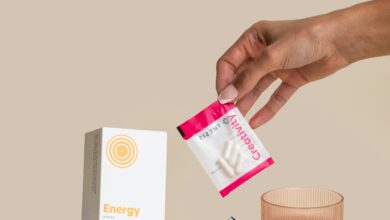The Role of Probiotics in Gut Health

The human gut is home to trillions of microorganisms, collectively known as the gut microbiota , which play a crucial role in maintaining overall health. Among these microorganisms, probiotics —live beneficial bacteria and yeasts—have gained significant attention for their ability to support digestive health, boost immunity, and even influence mental well-being. This article explores the role of probiotics in gut health, how they work, their benefits, and considerations for incorporating them into your daily routine.
What Are Probiotics?
Probiotics are live microorganisms that, when consumed in adequate amounts, provide health benefits to the host. They are often referred to as “good” or “friendly” bacteria because they help maintain a balanced gut microbiome. Common strains of probiotics include:
- Lactobacillus: Found in yogurt and fermented foods, this strain helps with lactose digestion and supports immune function.
- Bifidobacterium: Naturally present in the large intestine, it aids in breaking down dietary fiber and producing short-chain fatty acids (SCFAs).
- Saccharomyces boulardii: A beneficial yeast that combats harmful pathogens and alleviates diarrhea.
Probiotics can be obtained through food sources (e.g., yogurt, kefir, sauerkraut) or dietary supplements.
How Do Probiotics Work?
Probiotics contribute to gut health by performing several key functions:
1. Restoring Microbial Balance
The gut microbiome thrives on diversity, but factors like poor diet, antibiotics, stress, and illness can disrupt its balance, leading to an overgrowth of harmful bacteria. Probiotics help restore equilibrium by introducing beneficial microbes that compete with harmful ones.
2. Enhancing the Gut Barrier
The lining of the intestines acts as a barrier, preventing toxins and pathogens from entering the bloodstream. Probiotics strengthen this barrier by promoting the production of mucus and tight junction proteins, reducing the risk of “leaky gut syndrome.”
3. Producing Beneficial Compounds
Probiotics produce substances like SCFAs (e.g., butyrate), vitamins (e.g., B vitamins, vitamin K), and antimicrobial compounds that nourish intestinal cells and inhibit the growth of harmful bacteria.
4. Modulating the Immune System
Approximately 70% of the immune system resides in the gut. Probiotics interact with immune cells to regulate inflammation, enhance pathogen defense, and prevent autoimmune responses.
Benefits of Probiotics for Gut Health
1. Improving Digestive Disorders
Probiotics are widely used to manage various gastrointestinal conditions, including:
- Irritable Bowel Syndrome (IBS): Reduces symptoms like bloating, gas, and abdominal pain.
- Inflammatory Bowel Disease (IBD): Helps reduce inflammation in Crohn’s disease and ulcerative colitis.
- Diarrhea: Prevents antibiotic-associated diarrhea and traveler’s diarrhea.
2. Supporting Nutrient Absorption
A healthy gut microbiome facilitated by probiotics enhances the absorption of essential nutrients, such as calcium, magnesium, and iron, improving overall nutrition.
3. Preventing and Treating Infections
Probiotics combat harmful bacteria like Clostridioides difficile (C. diff) and Helicobacter pylori , which cause severe infections and ulcers.
4. Alleviating Constipation
Certain probiotic strains, such as Bifidobacterium lactis , improve bowel regularity and soften stools.
5. Reducing Symptoms of Lactose Intolerance
Probiotics containing Lactobacillus break down lactose into lactic acid, making dairy products easier to digest for lactose-intolerant individuals.
Beyond Gut Health: Systemic Benefits of Probiotics
While probiotics are primarily associated with gut health, their effects extend throughout the body:
1. Mental Health (Gut-Brain Axis)
The gut-brain axis connects the central nervous system with the enteric nervous system. Probiotics may alleviate symptoms of anxiety, depression, and stress by modulating neurotransmitter production (e.g., serotonin).
2. Immune Function
By regulating immune responses, probiotics reduce the frequency and severity of respiratory infections, allergies, and autoimmune diseases.
3. Weight Management
Some studies suggest that certain probiotic strains, such as Lactobacillus gasseri , promote weight loss by influencing fat metabolism and appetite regulation.
4. Skin Health
Probiotics may improve skin conditions like eczema, acne, and rosacea by reducing systemic inflammation and supporting a healthy gut-skin connection.
Sources of Probiotics
1. Fermented Foods
Fermented foods are rich in natural probiotics and should be included in a balanced diet:
- Yogurt (with live cultures)
- Kefir
- Sauerkraut
- Kimchi
- Miso
- Tempeh
- Kombucha
2. Dietary Supplements
Probiotic supplements come in capsules, tablets, powders, and liquids. When choosing a supplement, consider the following:
- Strain Specificity: Look for strains tailored to your needs (e.g., Lactobacillus rhamnosus for diarrhea).
- Colony Forming Units (CFUs): Ensure the product contains an adequate number of CFUs (typically 1–10 billion per serving).
- Shelf Stability: Opt for products with guaranteed potency until expiration.
3. Synbiotics
Synbiotics combine probiotics with prebiotics (non-digestible fibers that feed good bacteria). Examples include chicory root, garlic, onions, and bananas.
Considerations and Precautions
While probiotics are generally safe for most people, there are some important considerations:
- Individual Variability
- Not all probiotics work the same way for everyone. Factors like age, genetics, and existing gut health influence outcomes.
- Potential Side Effects
- Mild side effects, such as bloating, gas, or diarrhea, may occur initially as the gut adjusts.
- Underlying Health Conditions
- Individuals with compromised immune systems or serious illnesses should consult a healthcare provider before taking probiotics.
- Quality Matters
- Choose reputable brands that undergo third-party testing for purity and potency.




